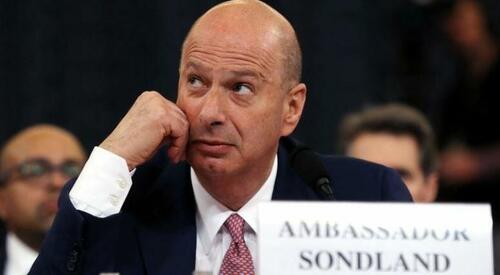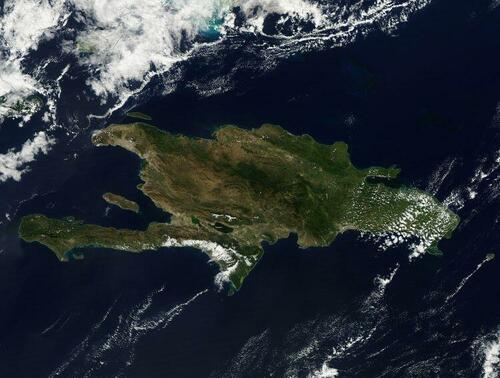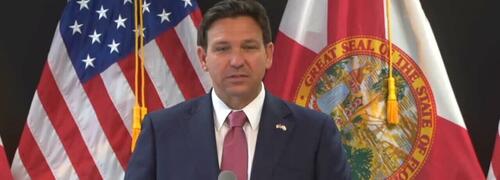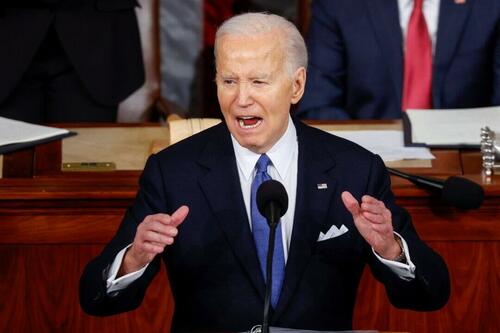Former President Donald Trump’s net worth topped $6.4 billion on Monday following the completion of a 29-month-long SPAC deal for his social media company, Trump Media & Technology Group (now trading under symbol $DJT).
According to Bloomberg‘s index of the world’s richest people, Trump is in 328th place, with a net worth of $7.81 billion. George Soros, the nemesis of Democracy, is sitting in 375th place with a net worth of $7.16 billion.
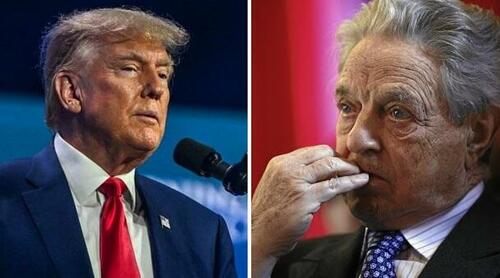
While that’s cute and all, dick-measuring doesn’t matter since the 93-year-old Hungarian investor uses his money as a weapon – and has directly affected both politics, crime, and demographics through financial support – and facilitation, of open-border policies and soft-on-crime elected officials.
Soros is perhaps best known as the man who ‘broke’ the Bank of England – when he made roughly $1 billion in profit shorting the British pound sterling during the UK’s 1992 Black Wednesday financial crisis.
In 1991, the Washington Post dubbed Soros an “overt operative” of US-backed regime change in Europe. More recently, as noted above, Soros has poured his resources into organizations that promote a Marxist agenda, including censoring free speech under the guise of combating “disinformation.”
As David Galland and Stephen McBride noted in 2016 – before Soros’s widespread support of US District Attorneys kicked into high gear:
What is this globalist agenda, and where does it come from?
The Humble Beginnings
The globalist seed was sowed for young George by his father, Tivadar, a Jewish lawyer who was a strong proponent of Esperanto. Esperanto is a language created in 1887 by L.L. Zamenhof, a Polish eye doctor, for the purpose of “transcending national borders” and “overcoming the natural indifference of mankind.”
Tivadar taught young George Esperanto and forced him to speak it at home. In 1936, as Hitler was hosting the Olympics in Berlin, Tivadar changed the family name from Schwartz to Soros, an Esperanto word meaning “will soar.”
George Soros, who was born and raised in Budapest, Hungary, benefited greatly from his father’s decision.
Allegedly, in 1944, 14-year-old George Soros went to work for the invading Nazis. It is said that until the end of the war in 1945, he worked with a government official, helping him confiscate property from the local Jewish population.
In an 1998 interview with 60 Minutes, Soros described the year of German occupation as “the happiest time in my life.”
Soros’s Venture into Finance
When the war ended, Soros moved to London and in 1947 enrolled in the London School of Economics where he studied under Karl Popper, the Austrian-British philosopher who was one of the first proponents of an “Open Society.”
Soros then worked at several merchant banks in London before moving to New York in 1963. In 1970, he founded Soros Fund Management and in 1973 created the Quantum Fund in partnership with investor Jim Rogers.
The fund made annual returns of over 30%, cementing Soros’s reputation and putting him in a position of power—one he utilizes to this day to advance the agenda of his mentors.
The Currency Speculations That Threw Britain and Asia into Crisis
In the 1990s, Soros began a string of large bets against national currencies. The first was in 1992, when he sold short the pound sterling and made a $1 billion profit in a single day.
His next big currency speculation came in 1997. This time Soros singled out the Thai baht and, with heavy short-selling volume, destroyed the baht’s artificial peg to the US dollar, which started the Asian financial crisis.
“Humanitarian” Efforts
Today, Soros’s net worth stands at $23 billion. Since taking a back seat in his company, Soros Fund Management, in 2000, Soros has been focusing on his philanthropic efforts, which he carries out through the Open Society Foundations he founded in 1993.
So who does he donate to, and what causes does he support?
During the 1980s and 1990s, Soros used his extraordinary wealth to bankroll and fund revolutions in dozens of European nations, including Czechoslovakia, Croatia, and Yugoslavia. He achieved this by funneling money to political opposition parties, publishing houses, and independent media in these nations.
If you wonder why Soros meddled in these nations’ affairs, part of the answer may lie in the fact that during and after the chaos, he invested heavily in assets in each of the respective countries.
He then used Columbia University economist Jeffrey Sachs to advise the fledgling governments to privatize all public assets immediately, thus allowing Soros to sell the assets he had acquired during the turmoil into newly formed open markets.
Having succeeded in advancing his agenda in Europe through regime change—and profiting in the process—he soon turned his attention to the big stage, the United States.
The Big Time
In 2004, Soros stated, “I deeply believe in the values of an open society. For the past 15 years I have been focusing my efforts abroad; now I am doing it in the United States.”
Since then, Soros has been funding groups such as:
- The American Institute for Social Justice, whose aim is to “transform poor communities through lobbying for increased government spending on social programs”
- The New America Foundation, whose aim is to “influence public opinion on such topics as environmentalism and global governance”
- The Migration Policy Institute, whose aim is to “bring about an illegal immigrant resettlement policy and increase social welfare benefits for illegals”
Soros also uses his Open Society Foundations to funnel money to the progressive media outlet, Media Matters.
Soros funnels the money through a number of leftist groups, including the Tides Foundation, Center for American Progress, and the Democracy Alliance in order to circumvent the campaign finance laws he helped lobby for.
Why has Soros donated so much capital and effort to these organizations? For one simple reason: to buy political power.
Democratic politicians who go against the progressive narrative will see their funding cut and be attacked in media outlets such as Media Matters, which also directly contribute to mainstream sites such as NBC, Al Jazeera, and The New York Times.
Apart from the $5 billion Soros’s foundation has donated to groups like those cited above, he has also made huge contributions to the Democratic Party and its most prominent members, like Joe Biden, Barack Obama, and of course Bill and Hillary Clinton.
Best Friends with the Clintons
Soros’s relationship with the Clintons goes back to 1993, around the time when OSF was founded. They have become close friends, and their enduring relationship goes well beyond donor status.
According to the book, The Shadow Party, by Horowitz and Poe, at a 2004 “Take Back America” conference where Soros was speaking, the former first lady introduced him saying, “[W]e need people like George Soros, who is fearless and willing to step up when it counts.”
Soros began supporting Hillary Clinton’s current presidential run in 2013, taking a senior role in the “Ready for Hillary” group. Since then, Soros has donated over $15 million to pro-Clinton groups and Super PACs.
More recently, Soros has given more than $33 million to the Black Lives Matter group, which has been involved in outbreaks of social unrest in Ferguson, Missouri, and Baltimore, Maryland, in 2015. Both of these incidents contributed to a worsening of race relations across America.
The same group heavily criticized Democratic contender Bernie Sanders for his alleged track record of supporting racial inequality, helping to undercut him as a competitive threat with one of Hillary Clinton’s most ardent constituencies.
This, of course, greatly enhances the clout Soros wields through the groups mentioned above. It is safe to assume that he is now able to drive Democratic policy, especially in an administration headed by Hillary Clinton.
Simply, what Soros wants, he gets. And it’s clear from his history that he wants to smudge away national borders and create the sort of globalist nightmare represented by the European Union.
In recent years, Soros has turned his attention back to Europe. Is it a coincidence that the continent is currently in economic and social disarray?
Another Home Run: the Ukrainian Conflict
There’s no doubt about Soros’s great influence on US foreign policy. In an October 1995 PBS interview with Charlie Rose, he said, “I do now have access [to US Deputy Secretary of State Strobe Talbott]. There is no question. We actually work together [on Eastern European policy].”
Soros’s meddling reared its ugly head again in the Russia-Ukraine conflict, which began in early 2014.
In a May 2014 interview with CNN, Soros stated he was responsible for establishing a foundation in the Ukraine that ultimately led to the overthrow of the country’s elected leader and the installation of a junta handpicked by the US State Department, at the time headed by none other than Hillary Clinton:
CNN Host: First on Ukraine, one of the things that many people recognized about you was that you during the revolutions of 1989 funded a lot of dissident activities, civil society groups in Eastern Europe and Poland, the Czech Republic. Are you doing similar things in Ukraine?
Soros: Well, I set up a foundation in Ukraine before Ukraine became independent of Russia. And the foundation has been functioning ever since and played an important part in events now.
The war that ripped through the Ukrainian region of Donbass resulted in the deaths of over 10,000 people and the displacement of over 1.4 million people. As collateral damage, a Malaysia Airlines passenger jet was shot down, killing all 298 on board.
But once again Soros was there to profit from the chaos he helped create. His prize in Ukraine was the state-owned energy monopoly Naftogaz.
Soros again had his US cronies, Secretary of the Treasury Jack Lew and US consulting company McKinsey, advise the puppet government of Ukraine to privatize Naftogaz.
Although Soros’s exact stake in Naftogaz has not been disclosed, in a 2014 memo he pledged to invest up to $1 billion in Ukrainian businesses, but no other Ukrainian holdings have since been reported.
His Latest Success: the European Refugee Crisis
Soros’s agenda is fundamentally about the destruction of national borders. This has recently been shown very clearly with his funding of the European refugee crisis.
The refugee crisis has been blamed on the civil war currently raging in Syria. But did you ever wonder how all these people suddenly knew Europe would open its gates and let them in?
The refugee crisis is not a naturally occurring phenomenon. It coincided with OSF donating money to the US-based Migration Policy Institute and the Platform for International Cooperation on Undocumented Migrants, both Soros-sponsored organizations. Both groups advocate the resettlement of third-world Muslims into Europe.
In 2015, a Sky News reporter found “Migrant Handbooks” on the Greek island of Lesbos. It was later revealed that the handbooks, which are written in Arabic, had been given to refugees before crossing the Mediterranean by a group called “Welcome to the EU.”
Welcome to the EU is funded by—you guessed it—the Open Society Foundations.
Soros has not only backed groups that advocate the resettlement of third-world migrants into Europe, he in fact is the architect of the “Merkel Plan.”
The Merkel Plan was created by the European Stability Initiative whose chairman Gerald Knaus is a senior fellow at none other than the Open Society Foundations.
The plan proposes that Germany should grant asylum to 500,000 Syrian refugees. It also states that Germany, along with other European nations, should agree to help Turkey, a country that’s 98% Muslim, gain visa-free travel within the EU starting in 2016.
Political Discourse
The refugee crisis has raised huge concern in European countries like Hungary.
In response to 7,000 migrants entering Hungarian territory per day in 2015, the Hungarian government reestablished border control in order to keep the hordes of refugees from entering the country.
Of course this did not go down well with Soros and his close allies, the Clintons.
Bill Clinton has since come out and accused both Poland and Hungary of thinking “democracy is too much trouble” and wanting to have a “Putin-like authoritarian dictatorship.”
Seeing through Clinton’s comments, Hungarian Prime Minister Viktor Orbán responded by saying, “The remarks made about Hungary and Poland … have a political dimension. These are not accidental slips of the tongue. And these slips or remarks have been multiplying since we are living in the era of the migrant crisis. And we all know that behind the leaders of the Democratic Party, we have to see George Soros.”
He went on to say that “although the mouth belongs to Clinton, the voice belongs to Soros.”
Soros has since said of Orbán’s policy toward the migrants: “His plan treats the protection of national borders as the objective and the refugees as an obstacle. Our plan treats the protection of refugees as the objective and national borders as the obstacle.”
It’s hard to imagine that he could be any clearer in his globalist intentions.
